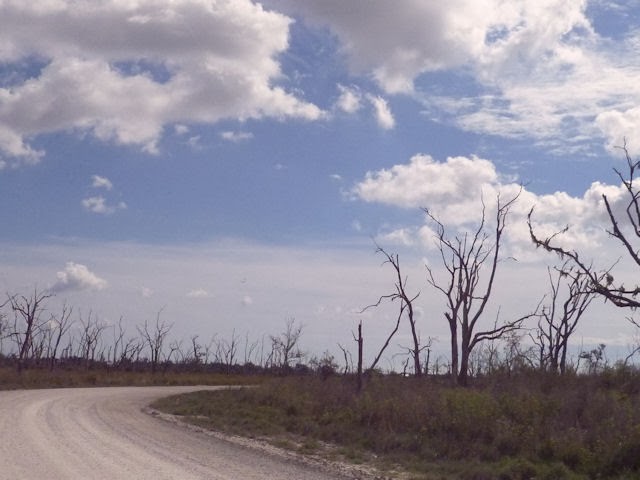Growing up, I fished Port Sulfur, Lafitte, and Myrtle Grove.
Fished in what I thought were calm, quiet branches of bayous and lakes.
And for what?
Those straight watery paths are part of the 10,000 miles of oil canals (Tidwell 35-36) that make a maze out of the lower portion of Louisiana.
At the time, I thought I was just fishing in a nice spot. An "X" spot even.
Some of these canals hold oil equipment like pipelines and "Christmas Trees."
Some of the canals were cut simply to create a liquid road through muddy marsh. Allowing easy movement of equipment and workers to drilling sites.
Ultimately, these canals all do the same thing.
Speed up erosion.
Tides and storms--especially hurricanes--naturally cause erosion. But miles of canals carving up the marsh compound the problem. The push and pull of water in and out of these canals wears away at the banks, widening the canals. Lapping at and eroding what's left. Sucking up the land.
My uncle, who runs charter fishing trips as a side job, told me that his GPS maps--only a few years old--often show him driving his boat over land. It's a common story that many tell. In reality, he's moving along through open water. The land on the maps is gone. That's how rapid this process can be. In only a few years, land has vanished.
Erosion is just the start, really. The very tip.
Other forms of destruction follow. And cause more loss.
When erosion occurs, marsh grasses wash away. Roots no longer hold soil in place...leading to further erosion. Loss of grass also means loss of habitat.
Nesting grounds for waterfowl and migratory birds are disappearing. So the birds disappear too. An aerial population study of waterfowl at the end of 2013 showed that their numbers were almost the lowest they've been since 1969.
In the past five years, I've noticed firsthand a decline in the population of Brown Pelicans.
Our state bird. And we can't even keep it here.
Habitat loss also stretches to marine life. Shrimp and many species of fish use protective wetlands as nurseries and, of course, sources of food.
This thing. This black, sucking hole grabs from so many directions.
When I was about 14, my family and I traveled a little farther south than normal. I remember seeing a massive stand of trees from the elevated highway. All skeletons. Every one gnarled up. Bones. Leafless. Looking like winter when it wasn't. I asked what had happened to the trees.
Saltwater intrusion.
Salt seeped in. The trees drank up the salt. Died. Hundreds of them. Nothing but a graveyard.
As land wears away down here, salt water moves farther inland, killing off marsh grass and trees.
As more salt seeps in, more land is lost without plant roots to hold it in place.
It's a deadly circle of constant erosion and habitat loss.
 |
| The trees in the background have died due to saltwater intrusion |
As a state--as a country--we benefit from and are addicted to oil. Louisiana greedily reaped the bounties of the oil boom in the 1970s and early 80s. Money flowed in without a care for what these activities did to the environment.
We violated our coast in intimate and traumatic ways for our own gain.
Took what we could however we wanted. And as long as the money flowed, we didn't care about where the salt flowed or where the land drifted off to. I guess things don't change much.
Sure, fewer permits are issued for digging canals. Sure, there are efforts to fill in some of these canals and try to slow down the erosion they cause. In my opinion, these actions are mostly appearance only. To shut people like me up.
See what we're doing? We're helping!
It's not enough. Not even close.
Works consulted:
Louisiana Sportsman http://www.louisianasportsman.com/
Tidwell, Mike. Bayou Farewell: The Rich Life and Tragic Death of Louisiana's Cajun Coast. New York: Pantheon Books, 2004.
Turning the Tide. Louisiana Public Broadcasting, 2011.
Linking with:
 |
 |























*Sad* truly sad Michelle. We are loosing so much of our fish in the Great Lakes for various reasons despite the Clubs maintaining hatcheries & re-stocking efforts. Our futures in some of these areas are pretty bleak. One reason I am not unhappy about have LOTS of snow this Winter is that it helps restore some of our water tables. Enjoyed your post, although my heart aches for these losses.
ReplyDeleteSo sad. I am surprised that groups like Ducks Unlimited and other wetland hunting/conservation groups aren't lobbying more for anti-erosion measures. As with so many other things, we think only in the now instead of thinking about the consequences several generations from now.
ReplyDeleteThis is so worthwhile to read. Thanks for taking the time to share with us.
ReplyDeleteI am glad you are writing about the decline. Here in South Florida I feel the same way, but it is from over developing our Ag reserve. It angers me that greed over future generations habitat wins. Thank you for sharing it on our Four Seasons Blog Hop. Pinning now.
ReplyDeleteMichelle, this is just heartbreaking. Much of the Texas coastline area has been poisoned by the gas and oil industry, too. And like you said, it's unlimited in the ever-expanding circles of damage it creates- a domino effect.
ReplyDeleteThank you for raising awareness about this and sharing it at Treasure Box Tuesday.
Very informative. Plan on sharing. I think it's important for others to see this.
ReplyDeleteAngela @ Time with A & N
How sad, Michelle. I knew erosion was a problem - but I never really understood the extent. I also never realized how *much* is really being affected. I really hope it's not too late and that something can be done to reverse some of the damage! :(
ReplyDeleteShelly please contact me @ johnlouis45@aol.com I have to help guide you further into the basics of marsh creation and the good that diversions will and can do. The conclusion that the diversions create only shallow rooted plants are correct but that is the first building block of marsh creation. I have pools of history and information I would like to pass on to you. Your generation will pass the torch to the next as we did to you. Thanks your old Daddy's buddy Johnny Hebert.
ReplyDelete